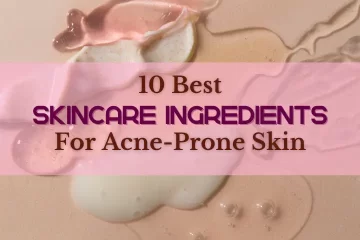Read This Before Buying Exfoliants

Our skin is the largest part of our body. Everyone wants healthy glowing looking skin but we tend to get lazy when it comes to taking care of our skin. Well, that’s why I’m here writing blog posts that will motivate you out there to want to take care of your skin. We adopt many methods and techniques to make our skin healthy (mostly paid). It’s not necessary to go to a professional for your skin treatment. It would be best if you used some ways at home too. It’s easier on your pocket :-p
Our skin is regenerated every month, but many factors slow this process down, like aging, exposure to dust and UV rays, etc. So, a comfortable and prompt way to remove dead skin is “exfoliation.” It is an essential step to beautify your skin. It’s suggested to do exfoliation twice a week, and so many products are available in the market for this purpose, but what should you use according to your skin type?
The main question that arises in our minds is with all these different types of exfoliants out there which exfoliant is the best for our skin, and your answer is chemical exfoliants. what are chemical exfoliants? let’s find out the answer.
What are chemical exfoliants?
Chemical exfoliants are acids that are capable of removing dead skin cells on your face and neck and help rejuvenate the skin. But don’t panic after hearing the word acid because it depicts the reaction your skin experiences when using a chemical exfoliant. They gradually absorb in your skin’s layers and break down dead skin cells by chemical reaction.
There are various types and concentrations of chemical exfoliants. Lower concentration chemical exfoliants are ideal for personal use, and it is readily available in a general store or pharmacy. On the other hand, highly concentrated chemical exfoliants are available at salons or dermatologists who apply them on the skin as a chemical peel treatment. These more concentrated types are not recommended to be used at home by yourself. They are for professional use only. If you use these concentrated types without a professional then they may cause your skin to burn.
What are physical exfoliants?
The products which contain harsh particles like granules, grains, or grounded nuts are called physical exfoliants such as scrubs. These physical exfoliants remove dead skin cells but can cause micro-tears in the skin if not used properly or overused. They are not recommended by dermatologists. Stay away from the type that has tree nut shells like walnut shells because they can damage the skin over time.
Why physical exfoliants are not suggested?
Exfoliation is essential for the skin, and it is your personal preference whether to use chemical exfoliants or physical ones. But you must keep one thing in mind that physical exfoliants are not preferred, and let me tell you why it is so.
- It is not suitable for sensitive skin.
If you have sensitive skin, then a physical exfoliant is not your thing because it has rough and harsh particles that your skin will not bear. You might get rashes, redness, burning, and irritation instead of achieving its benefits. Delicate skin can face micro-tears, especially if scrub has large granules; you must avoid it.
- It can cause acne
If you have acne-prone skin, then physical exfoliants can even worsen the situation. You can get more acne while using them, but it is not applicable for all.
- It can cause dryness and flakiness.
Harsh and over scrubbing may lead to dryness, which can even make your skin flaky. This type of skin faces the skin dehydration issue too.
- It can cause permanent damage to your skin.
If you don’t use a physical exfoliant appropriately and puts so much pressure while exfoliating, the results can be terrifying as you can permanently damage your skin.
Myths about chemical exfoliants
- These are only suitable for winters.
Chemical exfoliants have become famous these days, but many myths are also prevailing about them. Let’s have a look at some of them.
The most common myth is that chemical exfoliants are best for winter use only, but it’s not a fact. You can use light peels throughout the year, even in summers too.
- Using a chemical exfoliant is a one-time procedure.
They help repair the skin, and it’s not like that it is some miracle and you get evergreen results in one use. Undoubtedly, the effects are visible in first use, but you have to be consistent to attain the best outcome.
- All chemical exfoliants are the same.
It is also a popular myth about them, but trust me, every peel is different. Some are lighter while the others are strong. The results also vary from peel to peel.
- They help to treat deep scars.
If you are the one who believes in this myth, then rectify yourself because peels can’t remove deep scars like a cut or a very old popped pimple scar. They are only useful for minimal blemishes like freckles or light spots.
- They hurt badly
Due to the word “chemical” or “acid,” a myth is generated that they hurt badly, but it’s not the case. Some peels cause minor pain, while others cause just a stinging sensation on the skin.
Types of chemical exfoliants
Chemical exfoliants are classified into three types:
AHA (Alpha Hydroxy Acid)
AHA’s are the exfoliants derived from plants and fruits and the best choice for every skin type. Their function is limited to the surface skin layer. The well-known examples are lactic acid, glycolic acid, malic acid, etc.
BHA (Beta Hydroxy Acid)
The oil-soluble acids BHA work on the oiliest skin parts. These absorb excess sebum to prevent clogging up the pores. They are appropriate for every skin type, but for oily skin, they are bay. Salicylic acid, wintergreen leaves are examples.
PHA (Poly Hydroxy Acid)
PHA is the next version of AHA, but it has sizeable molecules than AHA, making it ideal for sensitive skin. The examples of PHA are Lacto bionic acid, gluconolactone.
Benefits of chemical exfoliants
- Chemical exfoliants are gentle, so these are considered the best for sensitive skin.
- Low-concentrated chemical exfoliants are an excellent option for at-home use.
- They cure and nourish dry and sun-damaged skin.
- AHA chemical exfoliants don’t take away the skin’s natural oils and remain hydrated and moisturized.
- If dark spots are on the upper skin layer, these exfoliators eliminate them and make skin clear.
- They speed up the process of shedding dead and dry skin and regenerate new skin cells.
- Some chemical exfoliants are perfect for dry skin, while the others work well on oily and acne-prone skin.
- They help to reduce inflammation.
Side effects of chemical exfoliants
Like everything, chemical exfoliants also have side effects along with the pros.
- It can cause permanents scars on the skin.
- Both darkening and lightening of skin complexion are experienced after using chemical exfoliants.
- In some cases, these exfoliants can be a reason for bacterial or fungal infections,
- Some deep peels have adverse effects, such as liver, kidney, and heart muscles’ damage.
- In deep peels, local or general anesthesia is required that has risks too.
- Sometimes, redness after chemical exfoliation continues for months.
How to use it on different skin types?
Dry skin
The AHA chemical exfoliants are known as perfect for dry skin because they enhance skin ability to retain moisture and keep skin moisturized. The exfoliation of dry skin is recommended once or twice a week. It is essential to use a moisturizer having hyaluronic acid after using a chemical exfoliator on dry skin.
Normal skin
People with normal skin can use any chemical exfoliator, and they can do it twice or thrice a week.
Sensitive skin
If you have extremely sensitive skin, you should avoid physical exfoliation as it can be harmful instead of beneficial. If you want to do chemical exfoliation, you must do the patch test. For this, you have to apply a small amount on any discrete part and wait for 24 hours. If your skin face redness, swelling, itching, or irritation, never use it on your skin.
Oily or acne-prone skin
Exfoliating is great on oily skin to prevent acne by removing extra oil. People with oily skin can do it three times a week. Salicylic acid is the ideal chemical exfoliator for them. If you have active acne on your face, avoid using any exfoliator.
To Conclude
Indeed, exfoliation is a necessity for our skin to remove dead skin cells and rebuild new skin. The important thing is that you must choose an exfoliator according to your skin type carefully. The usage of the wrong exfoliator is dangerous and can damage your skin permanently. you can use a combination of physical and chemical exfoliants in your skincare routine.
If we talk about chemical exfoliants and physical exfoliants, the chemical one is recommended for many reasons. It depends on your preference, too but if you want long-lasting results, go for chemical exfoliants. Chemical exfoliants in itself is a huge topic and I’ll be writing about it soon in one of my next posts. stay tuned 😉


